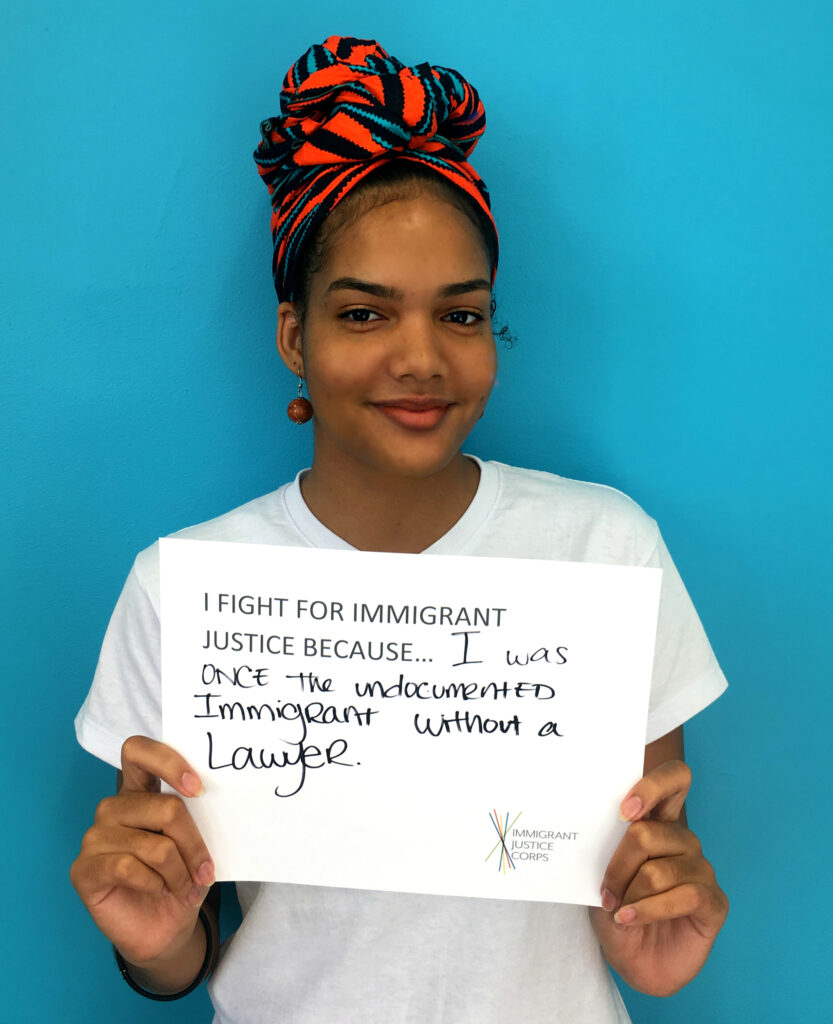Where are they now?: Allison Mandeville
In the “Where are they now?” series, we introduce you to former IJC Fellows and share their stories — how they became a Fellow and how their Fellowship experience informs their work today.
Allison Mandeville, a 2015 Community Fellow and 2020 Justice Fellow, is Appellate Counsel for the Immigration Justice Practice at the Center for Appellate Litigation. In the role, Allison works on post conviction relief for individuals who are not citizens and are facing some sort of immigration issue based on a prior criminal conviction.
Why did you become interested in immigration law?
When I was in college, I was very involved in working with folks who were recently resettled in the US as refugees. There’s a large community in New Haven of folks who’ve been resettled, primarily Iraq and Afghanistan at the time I was in college. I got involved working with that community and then through that, ended up in internships that were focused on refugee and immigration issues. And through that, I ended up working at a detention center in New Jersey with individuals who were seeking asylum, withholding of removal, and protection under the Convention Against Torture. That was where I had the first real glimpse of what this country’s horrific immigration detention system looks like and what a lawyer can do in that context that other people can’t do – being able to go into a detention center and talk to people who haven’t had contact yet with anybody who was able to help them with their case. It’s an incredibly privileged role to be in and comes with an immense amount of responsibility. Obviously, it’s a privilege that people trust you in that way. I felt like becoming trained as a legal representative was a way to have that access and those skills for something tangible that people need, in the face of a system that is deeply unjust.
What brought you to the IJC Fellowships?
I was interested in going into a career working with folks coming to the United States. IJC stood out to me because it’s a pretty rare opportunity for Community Fellows to actually be representing clients right out of college through accreditation as a BIA representative. I was very motivated by the fact that the Community Fellowship fills an important gap in terms of what legal services are available. Community Fellows do an immense number of affirmative applications every year, and those are applications that badly need to be done, so I was excited to be part of filling that gap in communities around New York.
And then for the Justice Fellowship, I applied for IJC again because I’d done IJC, and I knew that it would be a great experience and way to work with an organization that I was interested in working with, serving clients directly, and also have the community of IJC, which had stayed with me over the course of law school, starting with my first IJC cohort. Coming out of law school and already having that connection to IJC, I was excited to get to know even more folks within IJC and continue that relationship as I grew as an advocate.
What advice would you give a Fellow on their first day?
Listening very closely to our clients is the most important thing. You come in on day one with a lot of nervous energy and training, and you’re like, ‘okay, I’m ready, here we go, I’m going to do this thing that I’ve learned how to do, that I’m eager to do, to serve this client.’ But I think it really requires stepping back, decentering yourself, and just listening to the first client who walks in the door as you’re going through the intake you’ve been trained to do. Not being too laser focused on ‘now I ask this question and then I ask this question,’ but moving through it more organically so that the individual that you’re meeting, who’s trusting you with what’s going to be a difficult and complicated story, feels that you’re present and that you’re actually absorbing what they’re saying as a person, and that you’re not just going through the checklist of your legal training to get something done.
On a really tangible level, as I’ve practiced more, I’ve gotten in the habit of always asking clients where they want to start an intake. I think some people start intakes chronologically – when were you born, where were you born – and you just kind of march through someone’s life. I think at times that can be jarring and sort of disrespectful to where the client wants to start and what’s important to them at that moment to share, as you are getting to know each other. So I try to be more organic and flexible about receiving information and trying to make a safe and welcoming space for each person I’m getting the privilege to meet and start working with because that first impression is so important. Folks have not necessarily had the best experiences with lawyers during their lives, and if on top of that, if you’re coming in and you’re not part of the community that you’re representing, that’s a dynamic you need to be cognizant of and sensitive to, and reflect on how race and class and privilege, all of that is playing into that first meeting and into the relationship from there on out. I think building those relationships thoughtfully and respectfully, starting from intake, is the most important part of our job, and feeds into how we are able to most effectively advocate on our clients’ behalf in a system that is at core deeply dehumanizing and rooted in structural racism (and doubly so when thinking about clients who are impacted by both the immigration and criminal legal systems).
